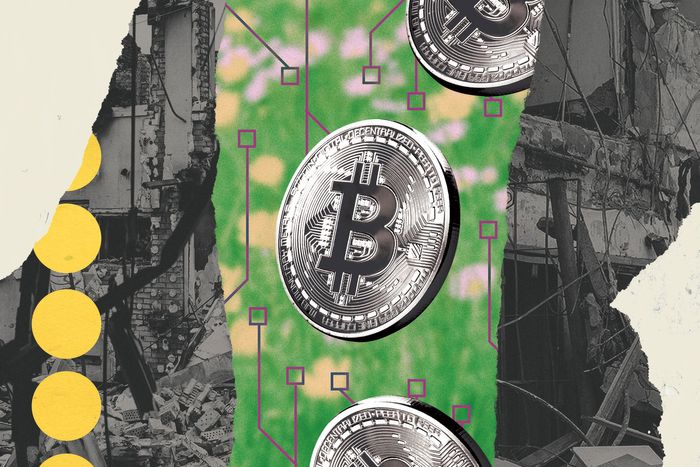
When western governments imposed sanctions on Russia after the invasion of Ukraine, seeking to sever Vladimir Putin’s banks and billionaires from global capital, Sam Bankman-Fried knew his company would have to comply. The 30-year-old, who is a billionaire 20 times over, runs FTX, one of the world’s largest cryptocurrency exchanges. It’s incorporated in Antigua, headquartered in the Bahamas, and regulated in the U.S. Crypto itself may be a borderless, supranational abstraction, but the companies that have sprung up around it are domiciled in places with laws, and they don’t get to pick and choose which ones to obey.
But after Bankman-Fried responded to the new rules, he went a step further. The American decided to block all Russian banks — even unsanctioned ones — from FTX, the better to ensure that the company’s platforms couldn’t be used to funnel assets to the pariah regime. Russian credit cards stopped working on FTX, and the platform stopped accepting Russian deposits. Then Bankman-Fried shut out banks in Kremlin-aligned Belarus as well. For him, the decision was easy, even obvious. “I don’t trust ourselves to be able to distinguish between the sketchiness of each individual institution,” he told me recently from Nassau. “I don’t want to be in a position of guessing, ‘Is this Russian bank, which is not sanctioned, acting as a conduit for that one?’ ” he said. “That’s a really messy situation, and you don’t want to fuck that up.”
His fellow crypto CEOs, however, seem perfectly comfortable fucking that up. The heads of most of the other exchanges have begrudgingly promised to abide by the sanctions and do what the law requires — and nothing more. “Frankly, I think the communication of the industry has been quite bad,” Bankman-Fried said. “It has sounded somewhat pro–sanctions evasion.”
Well before Russia’s war of aggression, there were worries that rogue states could use cryptocurrency to evade blacklists and move funds around the world in secret. On February 27, with Russian forces pressing toward Kyiv, Ukraine’s vice-prime minister issued a call for “all major crypto exchanges to block addresses of Russian users. It’s crucial to freeze not only the addresses linked to Russian and Belarusian politicians, but also to sabotage ordinary users.” Jesse Powell, the CEO of Kraken, rejected the idea out of hand, writing on Twitter that his company’s mission “is to bridge individual humans out of the legacy financial system and bring them into the world of crypto, where arbitrary lines on maps no longer matter, where they don’t have to worry about being caught in broad, indiscriminate wealth confiscation.” (“Besides,” he added, a little snottily, “if we were going to voluntarily freeze financial accounts of residents of countries unjustly attacking and provoking violence around the world, step one would be to freeze all U.S. accounts.”) Coinbase, another big platform, has taken the same position, as has Binance, the largest exchange by volume, which still allows trading in rubles.
Given all the libertarians in the cryptosphere (some anti-Establishment anarchists, more utopian ideologues), one might think the Russian state’s killing of Ukrainian civilians would provoke a stronger response. But aside from Bankman-Fried, most western leaders in the crypto community are responding to the war remarkably coolly. For Illia Polosukhin, the Ukrainian co-founder of a blockchain platform called Near, the issue is not so abstract. In recent weeks, his social-media feeds have bifurcated into posts about bombings near his hometown of Kharkiv and those discussing the price of bitcoin. “It’s surreal,” he said. “It was two direct opposites.” He left Kyiv for Lisbon in late January, before the invasion, but he still has family inside Ukraine. He’s not in favor of banning all Russians from crypto trading — that would be too indiscriminate — but he thinks it would make sense to block those still residing in Russia. In his view, anyone who remains there is complicit, and so are those who transact with them. “I do see operating in Russia as actively contributing dollars to the government, which is waging war,” he said.
Even though the crypto markets have long since been flooded by apolitical speculators whose only motivation is profit, the CEOs of the big exchanges are still influenced by (and often count themselves among) a cohort of true believers: early adopters who think that letting governments dictate who can trade digital coins compromises the very ethos of the technology.
Bitcoin, after all, was created in direct response to a global crisis: the mortgage meltdown of 2008 and the flood of stimulus by fiat that followed. It was both a financial innovation and a statement of principles; it had, bound up in its code, ideas about trust, transparency, autonomy, and the role of the state — or lack thereof. In the years since, as bitcoin and other digital tokens have proliferated, adherents have touted their borderless utility across a host of international problems and crises. Crypto is an elegant tool for immigrant laborers and refugees sending remittances to their home countries; it’s a banking alternative for Afghans fleeing the Taliban; it’s even a store of value for Venezuelans facing hyperinflation of the bolivar. But the Ukraine war dwarfs these concerns. And arriving at a moment when the global market cap for digital coins is approaching $2 trillion, it has helped turn borderlessness into a moral liability.
Crypto itself may be an unbeatable way to zap funds directly to Ukrainians defending their country, but the operators of these billion-dollar trading platforms are coming off as blasé, at best, about the possibility that their companies could be helping the Russian regime. When I asked Coinbase CEO Brian Armstrong last week whether he has a responsibility to take a stance on the war, a spokesperson immediately demurred on his behalf and directed me to a Twitter thread in which he had said, in part, “We don’t think there’s a high risk of Russian oligarchs using crypto to avoid sanctions.” Just a few days later, Christine Lagarde, the president of the European Central Bank, told a high-level gathering of industry experts that such techniques were “certainly being used, as we speak,” and accused crypto outfits of serving as “accomplices.”
It’s not the first time Armstrong has tried to stay out of a conflict. In 2020, after the murder of George Floyd, he said he didn’t think it was his place to weigh in on racial injustice and Black Lives Matter, asserting that Coinbase had an “apolitical culture.” His employees staged a walkout, and 60 of them resigned. Much has been made of the notion that we are living in an era of “woke capitalism,” with corporations being pushed by investors and their own workers to act in more socially responsible ways. The Ukraine war has only accelerated this reshuffling of the corporate moral order. As the Yale business scholar Jeffrey Sonnenfeld has pointed out, oil companies — oil! — led the exodus from Russia after Putin’s invasion, forfeiting billions in potential profit. Wall Street’s old guard followed suit. Goldman Sachs CEO David Solomon did get blowback for questioning whether it was the finance industry’s function to ostracize Russia, telling Time, “That’s not our job.” But he had already set in motion the firm’s exit, the first by a big bank. And he quickly put out a new statement: “We firmly believe it is our responsibility at Goldman Sachs to lead the way in supporting the U.S. and international community’s efforts to punish Putin and his regime.” The alarming implication is that aside from the likes of Bankman-Fried, the crypto industry — the ascendant force in finance, the recipient of so much talent and investment — has scruples far weaker than the vampire squid.
More on Ukraine
- House Passes Ukraine, Israel Aid: How It Happened
- Trump’s Plan for Every Foreign-Policy Problem Is Himself
- Putin Is Winning — and He’s Flaunting It






























